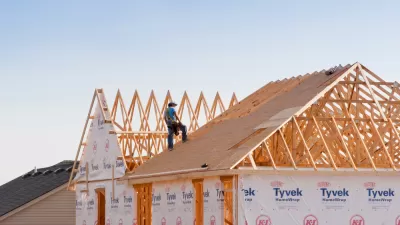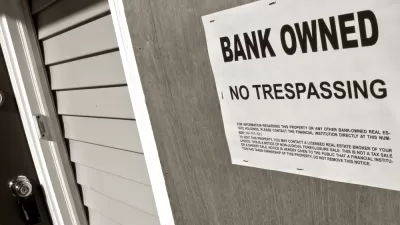Witold Rybczynski writes the epitaph for the McMansion. With the housing market in the toilet, Rybczynski says new homebuyers are going to be seeking something smaller, more affordable and possibly not a single-family home.
Rybczynski cites figures from 2006, just before the slump, when 2 million homes were being built in that year. For 2010, only 400,000 houses were erected. He attributes the crash to buyer skittishness, a sense that the market hasn't bottomed out and a lack of confidence that real estate will hold its value.
Interestingly, Rybczynski sees another, demographic cause for the homebuying slump:
"The other chief cause for weak demand is a slowdown in household formation-the U.S. Census reports that the rate of household formation is currently lower than at any time since 1947, as people put off getting married and starting a family. According to my colleague, real estate economist Peter Linneman, the marginal household size, which has historically hovered around two or three, shot up to more than six in 2009 and 2010, the result of doubling-up and moving in with relatives."
FULL STORY: The Death of the McMansion

Planetizen Federal Action Tracker
A weekly monitor of how Trump’s orders and actions are impacting planners and planning in America.

Restaurant Patios Were a Pandemic Win — Why Were They so Hard to Keep?
Social distancing requirements and changes in travel patterns prompted cities to pilot new uses for street and sidewalk space. Then it got complicated.

Map: Where Senate Republicans Want to Sell Your Public Lands
For public land advocates, the Senate Republicans’ proposal to sell millions of acres of public land in the West is “the biggest fight of their careers.”

Maui's Vacation Rental Debate Turns Ugly
Verbal attacks, misinformation campaigns and fistfights plague a high-stakes debate to convert thousands of vacation rentals into long-term housing.

San Francisco Suspends Traffic Calming Amidst Record Deaths
Citing “a challenging fiscal landscape,” the city will cease the program on the heels of 42 traffic deaths, including 24 pedestrians.

California Homeless Arrests, Citations Spike After Ruling
An investigation reveals that anti-homeless actions increased up to 500% after Grants Pass v. Johnson — even in cities claiming no policy change.
Urban Design for Planners 1: Software Tools
This six-course series explores essential urban design concepts using open source software and equips planners with the tools they need to participate fully in the urban design process.
Planning for Universal Design
Learn the tools for implementing Universal Design in planning regulations.
Heyer Gruel & Associates PA
JM Goldson LLC
Custer County Colorado
City of Camden Redevelopment Agency
City of Astoria
Transportation Research & Education Center (TREC) at Portland State University
Camden Redevelopment Agency
City of Claremont
Municipality of Princeton (NJ)





























